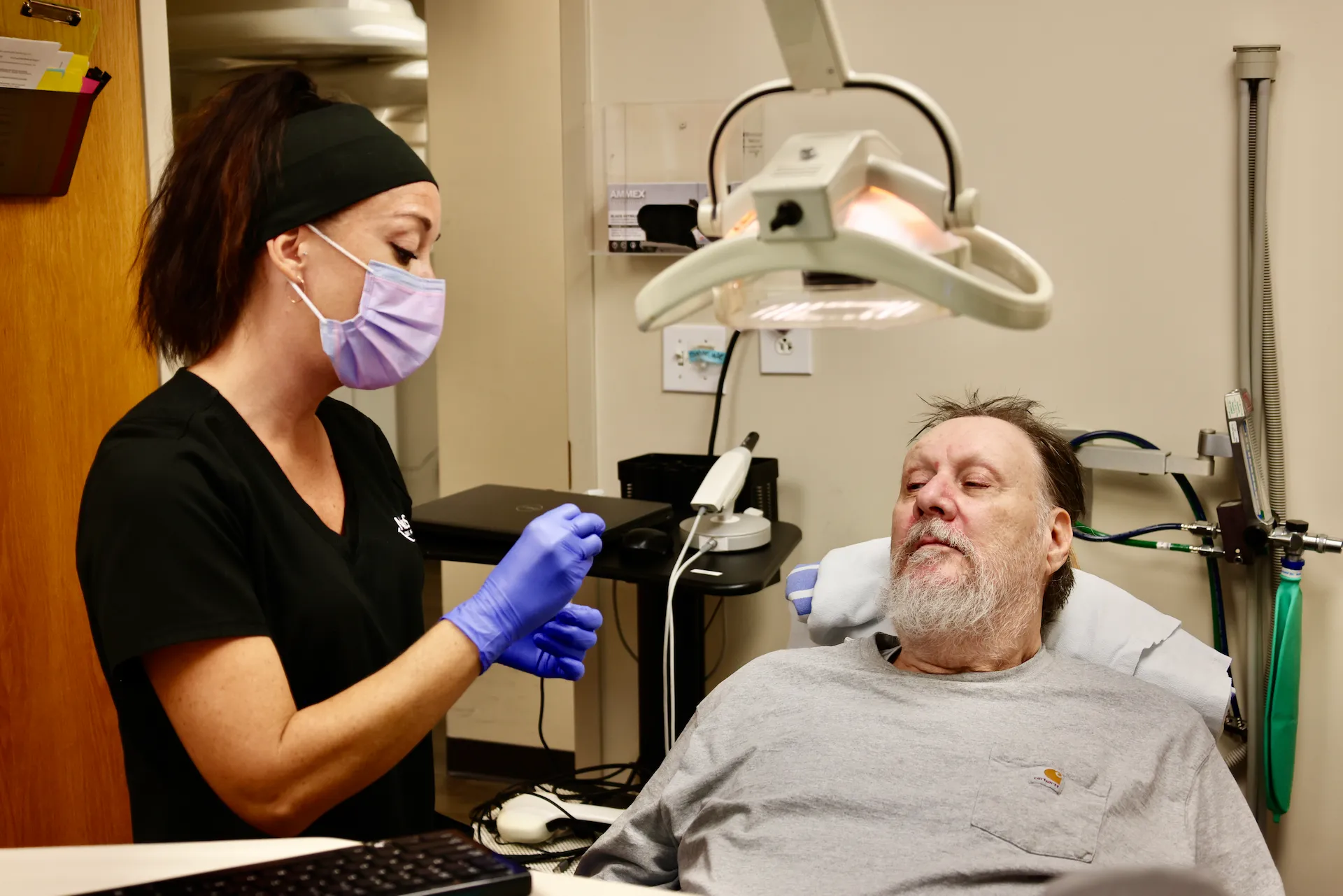You finally got your dental implants; you’re excited to enjoy your favorite foods and smile confidently again. But, your implant starts feeling loose! What happens now?
We understand that you could be concerned, at NuSet we take every possible measure to ensure your implants are successful, so let’s take a look at what could cause a loose dental implant and whether or not it is an emergency.
Your dental implant is supposed to be secure. A loose dental implant can be concerning, and acting quickly is essential. Ignoring it could lead to complete failure of the implant.
Understanding Dental Implants
Dental implants have three main parts: the implant, abutment, and crown. The implant is a small titanium or ceramic post inserted into your jawbone. It acts like a root for your new tooth. The abutment is a connector that holds the crown or restoration, which is the visible part of the implant.
These parts work together to provide a strong and durable tooth replacement. Understanding these components helps you recognize the importance of keeping your implant secure and why a loose implant requires immediate attention.
Is a Loose Dental Implant an Emergency?
A loose dental implant can be an emergency and ignoring it may lead to serious problems. Even if you don’t feel pain, a loose implant can cause bone loss and infection. These issues might make it impossible to save the implant, so acting quickly can be a proactive step towards protecting your oral health.
Leaving a loose implant untreated can also lead to implant failure. This means you might need a new implant, which is costly and time-consuming. Contact your dentist as soon as you notice any looseness. They will assess the situation and decide the best course of action. Taking swift action can save your implant and prevent further complications.
Causes of a Loose Dental Implant
A loose dental implant can be caused by many factors. All of these factors require emergency treatment. Here are some of the causes of loose dental implants:
Loose abutment
Sometimes, the issue isn’t with the implant itself but with its components. The abutment screw, which connects the implant post to the crown, can become loose over time. It’s the most common cause of loose implants, with up to 33% of cases due to a loosened abutment.
This mechanical problem can make the entire implant feel unstable. Unlike other issues, a loose abutment screw can often be fixed without needing to replace the implant. Your dentist can tighten or replace the screw to secure the implant, making this a relatively simple fix compared to other causes of looseness.
Bone loss
Bone loss can loosen an implant if there’s damage to bone density from infection, gum disease, or poor bone integration. This severe issue often requires emergency treatment to remove the implant screw and may need a bone graft for support.
Loose crown
A loose crown can also cause the implant to feel unstable. Teeth grinding or injuries can loosen the crown from the abutment. If the crown is still in good condition, it can be repaired and reattached.
Poor placement
If the implant was not placed correctly during surgery, it might not integrate properly with the jawbone, leading to looseness. Factors such as incorrect angling or depth during placement can prevent the implant from becoming stable.
Overloading
Excessive force from chewing or grinding can cause the implant to become loose. This is more likely if the implant is not properly aligned with your bite. Over time, the constant pressure can weaken the implant’s hold.
Gum recession
Receding gums can expose parts of the implant, leading to instability. Gum recession might be due to poor oral hygiene, aggressive brushing, or periodontal disease. As gums recede, the support around the implant diminishes, causing looseness.
Infections
An infection around the implant site, known as peri-implantitis, can weaken the bone and surrounding tissue. This infection leads to inflammation and bone loss, making the implant loose. Regular dental check-ups are essential to detect and treat infections early.
Addressing these issues promptly at NuSet Dental Implants and Oral Surgery is essential to maintaining your oral health and implant stability. If you experience any signs of a loose implant, contact us immediately to assess and address the problem.
Steps to Follow in Case of a Loose Dental Implant
If you suspect your dental implant is loose, follow these steps to address the issue promptly:
- To prevent further damage, avoid chewing on the side with the loose implant. Stick to soft foods like mashed potatoes, scrambled eggs, and yogurt that won’t put pressure on the implant.
- Keeping the area clean reduces the risk of infection, but be careful not to aggravate it more through excessive force.
- Call your dental practice as soon as you notice the looseness. Explain your symptoms clearly and request an urgent appointment.
- During your appointment, your oral surgeon will examine the implant and identify the cause of the looseness. X-rays or other imaging may be used to get a clear view.
- Depending on the cause, your oral surgeon will recommend a treatment plan. This might involve tightening the abutment screw, treating an infection, or in severe cases, replacing the implant.
Taking these steps promptly can help prevent further complications and ensure your implant remains secure.
Timely Intervention: Why it Matters
Addressing a loose dental implant quickly is crucial for several reasons:
- It prevents further damage.
- It can save the implant.
- A loose implant can lead to pain and discomfort. Treating it early can help you avoid unnecessary pain and maintain your oral health.
- Fixing a loose implant early can save you money. Delaying treatment can lead to more expensive procedures like bone grafts or implant replacement.
Prioritize seeing your dental implant specialist as soon as you notice any signs of a loose implant. Timely intervention can save your implant, prevent complications, and keep your smile healthy.
Secure Your Smile with Prompt Care at NuSet Dental Implants and Oral Surgery!
Addressing a loose dental implant quickly is essential for maintaining oral health. If your dental implant feels loose, don’t wait. Contact us right away for expert guidance and immediate assistance. Prompt care helps keep your dental implants secure and your smile healthy.
Frequently Asked Questions
What happens if your dental implant is loose?
If your dental implant is loose, it can lead to pain, discomfort, and potential damage to your bone and gums. Immediate action is needed to prevent further complications and possible implant failure. Contact your dentist right away for an evaluation and appropriate treatment.
Can a loose dental implant get infected?
Yes, a loose dental implant can get infected. When an implant is loose, it creates gaps where bacteria can enter, leading to infection. This can cause inflammation, bone loss, and further destabilization of the implant. Early treatment is essential to prevent infection.
Is a dental implant falling out an emergency?
Yes, a dental implant falling out is an emergency. If your implant falls out, it indicates a serious issue that needs immediate attention. Contact your dentist immediately to assess the situation and determine the best course of action.
Is it normal for a tooth implant to move?
No, it is not normal for a tooth implant to move. Dental implants are designed to be stable and secure. If you notice any movement, it indicates a problem that requires prompt attention from your dentist. Movement can signal issues with the implant, abutment, or surrounding bone.





